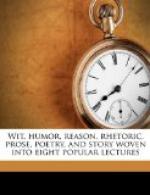Oh! how I would like to help some boy in this audience stand on his two feet and with clear brain, manly muscle, and moral courage fight and win the battle of life. How it would rejoice my soul if I could, with earnest appeal, throw about some mother’s boy an armor of celestial atmosphere against which the arrows of evil would beat in vain, and fall harmless at his feet.
Hear me, boys; never was there a day when character counted for so much as now; never a day when a young man, equipped with education and stability of character, filled with energy and ambition, was in such demand as he is today; while on the other hand, never was there a day when a young man with bad habits was in so little demand as now. The industrial world is closing its doors against young men who are not sober, industrious and competent. Even a saloon-keeper advertised thus: “Wanted—A man to tend bar, who does not drink intoxicating liquors.” How would this read: “Wanted—A young man to sell shoes, who goes bare-footed.”
Young women, just here I have a question for you. If the railroad company does not want the drinking man, if the merchant discriminates against him, and even the saloon-keeper does not want him for bar-tender, do you want him for a husband? Can you afford to wrap up your hopes of happiness in him and to him swear away your young life and love?
Some young woman may say: “If I taboo the drinking man, I may be an old maid.” Then be an old maid, get some “bloom of youth,” paint up and love yourself. John B. Gough said: “You better be laughed at for not being married, than never to laugh any more because you are married.”
If I could live life over there are some things I would not do. I would not stop smoking as I did thirty-five years ago, because I never would begin and therefore would not need to stop. I am not a fanatic on the question, but I believe every father in my presence, who uses tobacco, will be glad to have me say that which I will now say to the boys who are dulling their brains, poisoning their blood and weakening their hearts by the use of cigarettes.
Boys, I believe a cigar made me tell my first falsehood. When I was fifteen years of age I felt I must smoke if I ever expected to be a man. Father smoked, our pastor smoked, and so did almost every man in our neighborhood. My mother opposed the habit, but I thought mother did not know what it took to make a man.
I heard her make an engagement to spend a whole day ten miles from home the following week, and that day I set apart for learning to smoke cigars. I laid in some fine ones, six for five cents, and when mother went out the gate on her visit, I started for the barn. In a shed back of the barn I took out my cigars, determined to learn that day if it required the six cigars for my graduation. The first cigar was lighted and with every puff I felt the manhood coming; but in about five minutes I felt the manhood going. Just then my uncle called: “George, where are you?” When I answered he said: “Come here and hold this colt while I knock out a blind tooth.”




